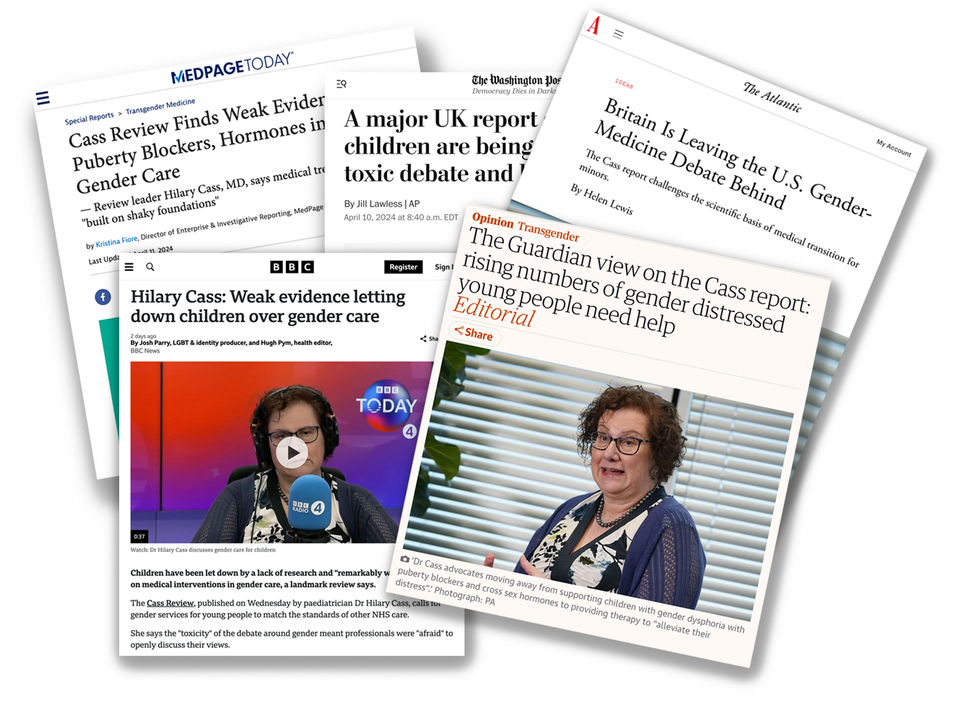The long wait.

The UK's long-awaited review into the treatment of adolescents with gender dysphoria has no idea what life as a trans kid is like.
Their conclusions may be well intended.
The consequences are going to be awful.
I'd like to extend my sympathies to the UK-based parents of children with gender dysphoria following publication of the Cass report [April 2024]. I understand how hard it must be to watch your child suffer psychologically, not only with the condition, and the social stigma of that condition, but also with the knowledge that the approach advocated by the trans community - the treatment they universally wish they had been allowed access to - is even harder to access... before it becomes a moot point.
Or, as the Guardian describes it:
before giving young people drugs, Dr Cass asks NHS medics to consider alternative interventions, especially for those with "existing mental health problems and neurodiversity". That seems uncontroversial, though the numbers waiting for mental health treatments dwarf those in gender-affirming care.
I am strongly convinced that in time this sentence will seem as obvious as it does with almost any other medical condition: "like most conditions, gender dysphoria, when treated early, can be managed and controlled."
Partly I believe this because I sat next to a child on puberty drugs (for precocious puberty) in 1987. Partly because my gender dysphoria disrupted 20 years of my life and because it left me with visible physical scars from self-harm and mental scars from societies' harm. Partly because delayed treatment estranged me from my children and my family for years and cost me tens of thousands of pounds despite top level 'medical insurance'.
Also because it was agony. Emotionally and physically. For example removing the 30,000 hairs on my face that began to grow during puberty required 150 hours of electrolysis. Electrolysis involves inserting a filament into each hair follicle where an electric current creates lye (sodium hydroxide) to permanently destroy the hair follicle. You use acid, basically. Laser works too, but it's temporary. The hair growth occurs because of the burst of testosterone, so you can block that entirely at puberty.
I also had my face peeled off in a twelve hour operation so that surgeons in Spain could shave off the extra bone that had built up on my nose, jaw, and brow. The build-up of bone that had given me, I am to understand, an attractive, manly jawline. The bones thicken because of testosterone, so you can block that entirely at puberty.
And I had a vaginoplasty, a surgical intervention pioneered in Weimar Germany in the 1920's. It has nothing to do with puberty and it is a major intervention that no one sane ought ever dream of offering or conducting on a child who cannot vote or buy a beer.
But did I need to do all these things?
Yes. I did. Yes or dead. Your call.
Of course I would never have needed to undergo the first two had puberty blockers been available as they were to my classmate. The third intervention has no place in any discussion about the treatment of trans-youth. None.
These aren't gory details. These are the practicalities of delaying treatment. I will leave the gore, and the bureaucracy, to your imagination - but as you consider the trials of a late transition alongside the inconveniences of exiling yourself to the lowest rung of western social castes - spare a thought for the parents of children being diagnosed with gender dysphoria. Dr Cass's report says that they must wait. Wait for more research. Wait until when exactly? Better research would be, will be, transformative and hugely applauded by the trans community, however it would be a stretch to suggest that we live in the golden age of funding for medical research with complex ethical issues. There is natural concern all over the scientific and LGBTQ community about how that might happen and what timeline implementation of that side of this report will follow.
As it happens I am also a parent of two growing boys. Last year one of them was diagnosed with an unexpected and life-threatening heart condition: a coarctation of the aorta. Within two months he underwent 6 hours of open heart surgery and now he does parkour on Fridays. As one nurse said, children "bounce back like a rubber ball". Their parents bounce back like squash balls. I still think about it and I am forever grateful to his mother for her early, unequivocal decision making.
So spare a thought for parents and their children who are no longer so empowered. If you have young children, or plan to have children you always worry about them. You will worry that they will have a life-threatening condition from the very first ultrasound. You probably can't name any other conditions where the state would deny your child treatment. Although plenty where they will have to wait a very long time. And so you can only pray that, as with my child, that if they are sick - it will be a condition that "when treated early, can be managed and controlled".
